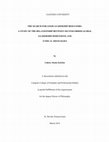Papers by Lidetu Alemu Kefenie
Journal article, 2021
Sequential explanatory mixed research was conducted among Ethiopian evangelical churches to disco... more Sequential explanatory mixed research was conducted among Ethiopian evangelical churches to discover the relationship between religious support and human flourishing. Data were collected from members of five of the largest evangelical churches in five major cities of Ethiopia, using Religious Support Scale and Flourishing Scale, followed by focus-group discussions and structured interviews of church leaders of these five churches. Descriptive statistics and simultaneous multiple regression indicated that religious support contributes to psychosocial well-being for church members. This finding is supported by the ensuing qualitative data analysis, which showed the understanding and contribution of church leaders toward well-being.
International Bulletin of Mission Research, 2020
Sequential explanatory mixed research was conducted among Ethiopian evangelical churches to disco... more Sequential explanatory mixed research was conducted among Ethiopian evangelical churches to discover the relationship between religious support and human flourishing. Data were collected from members of five of the largest evangelical churches in five major cities of Ethiopia, using Religious Support Scale and Flourishing Scale, followed by focus-group discussions and structured interviews of church leaders of these five churches. Descriptive statistics and simultaneous multiple regression indicated that religious support contributes to psychosocial well-being for church members. This finding is supported by the ensuing qualitative data analysis, which showed the understanding and contribution of church leaders toward well-being.

PhD Diiseertation, 2015
What is good leadership? And, what makes leadership good? This study bases itself on
the premise... more What is good leadership? And, what makes leadership good? This study bases itself on
the premise that good leadership is both effective and ethical. Thus, the purpose of this study was to find out the relationship between those effective second-order global leadership dimensions and ethical ideologies from the Ethiopian organizational context. In an era where corruption is both a national and global problem, finding out good leadership behaviors, which are both effective and ethical, is critical so that leadership development programs may be designed todevelop ethical leaders.
In this study, 160 mid-level managers of four Ethiopian governmental organizations were asked to fill out a 145-item questionnaire that is generated from two foundational questionnaires; namely, the Leader Attributes and Behavior Questionnaire (LABQ), which is developed by the GLOBE project, and Ethics Position Questionnaire (EPQ) developed by Donelson R. Forsyth.
The data were analyzed using SPSS version 20. Data analytic procedures included
descriptive statistics that includes frequency, mean, median, and median splitting of the scores. The major analytic procedure employed in this study, in addition to descriptive statistics, included multivariate analysis of variance (MANOVA), factorial MANOVA, and multinomial regression. Whenever MANOVA and factorial MANOVA indicated significant p values, analysis of variance (ANOVA) together with post hoc test was used as a follow-up test. Findings of the study are presented with pertinent analysis by discussing relevant issues related to leadership and ethics for the Ethiopian context.
Thesis Chapters by Lidetu Alemu Kefenie

PhD Dissertation, 2015
What is good leadership? And, what makes leadership good? This study bases itself on the premise ... more What is good leadership? And, what makes leadership good? This study bases itself on the premise that good leadership is both effective and ethical. Thus, the purpose of this study was to find out the relationship between those effective second-order global leadership dimensions and ethical ideologies from the Ethiopian organizational context. In an era where corruption is both a national and global problem, finding out good leadership behaviors, which are both effective and ethical, is critical so that leadership development programs may be designed to develop ethical leaders.
In this study, 160 mid-level managers of four Ethiopian governmental organizations were asked to fill out a 145-item questionnaire that is generated from two foundational questionnaires; namely, the Leader Attributes and Behavior Questionnaire (LABQ), which is developed by the GLOBE project, and Ethics Position Questionnaire (EPQ) developed by Donelson R. Forsyth.
The data were analyzed using SPSS version 20. Data analytic procedures included descriptive statistics that includes frequency, mean, median, and median splitting of the scores. The major analytic procedure employed in this study, in addition to descriptive statistics, included multivariate analysis of variance (MANOVA), factorial MANOVA, and multinomial regression. Whenever MANOVA and factorial MANOVA indicated significant p values, analysis of variance (ANOVA) together with post hoc test was used as a follow-up test. Findings of the study are presented with pertinent analysis by discussing relevant issues related to leadership and ethics for the Ethiopian context.










Uploads
Papers by Lidetu Alemu Kefenie
the premise that good leadership is both effective and ethical. Thus, the purpose of this study was to find out the relationship between those effective second-order global leadership dimensions and ethical ideologies from the Ethiopian organizational context. In an era where corruption is both a national and global problem, finding out good leadership behaviors, which are both effective and ethical, is critical so that leadership development programs may be designed todevelop ethical leaders.
In this study, 160 mid-level managers of four Ethiopian governmental organizations were asked to fill out a 145-item questionnaire that is generated from two foundational questionnaires; namely, the Leader Attributes and Behavior Questionnaire (LABQ), which is developed by the GLOBE project, and Ethics Position Questionnaire (EPQ) developed by Donelson R. Forsyth.
The data were analyzed using SPSS version 20. Data analytic procedures included
descriptive statistics that includes frequency, mean, median, and median splitting of the scores. The major analytic procedure employed in this study, in addition to descriptive statistics, included multivariate analysis of variance (MANOVA), factorial MANOVA, and multinomial regression. Whenever MANOVA and factorial MANOVA indicated significant p values, analysis of variance (ANOVA) together with post hoc test was used as a follow-up test. Findings of the study are presented with pertinent analysis by discussing relevant issues related to leadership and ethics for the Ethiopian context.
Thesis Chapters by Lidetu Alemu Kefenie
In this study, 160 mid-level managers of four Ethiopian governmental organizations were asked to fill out a 145-item questionnaire that is generated from two foundational questionnaires; namely, the Leader Attributes and Behavior Questionnaire (LABQ), which is developed by the GLOBE project, and Ethics Position Questionnaire (EPQ) developed by Donelson R. Forsyth.
The data were analyzed using SPSS version 20. Data analytic procedures included descriptive statistics that includes frequency, mean, median, and median splitting of the scores. The major analytic procedure employed in this study, in addition to descriptive statistics, included multivariate analysis of variance (MANOVA), factorial MANOVA, and multinomial regression. Whenever MANOVA and factorial MANOVA indicated significant p values, analysis of variance (ANOVA) together with post hoc test was used as a follow-up test. Findings of the study are presented with pertinent analysis by discussing relevant issues related to leadership and ethics for the Ethiopian context.
the premise that good leadership is both effective and ethical. Thus, the purpose of this study was to find out the relationship between those effective second-order global leadership dimensions and ethical ideologies from the Ethiopian organizational context. In an era where corruption is both a national and global problem, finding out good leadership behaviors, which are both effective and ethical, is critical so that leadership development programs may be designed todevelop ethical leaders.
In this study, 160 mid-level managers of four Ethiopian governmental organizations were asked to fill out a 145-item questionnaire that is generated from two foundational questionnaires; namely, the Leader Attributes and Behavior Questionnaire (LABQ), which is developed by the GLOBE project, and Ethics Position Questionnaire (EPQ) developed by Donelson R. Forsyth.
The data were analyzed using SPSS version 20. Data analytic procedures included
descriptive statistics that includes frequency, mean, median, and median splitting of the scores. The major analytic procedure employed in this study, in addition to descriptive statistics, included multivariate analysis of variance (MANOVA), factorial MANOVA, and multinomial regression. Whenever MANOVA and factorial MANOVA indicated significant p values, analysis of variance (ANOVA) together with post hoc test was used as a follow-up test. Findings of the study are presented with pertinent analysis by discussing relevant issues related to leadership and ethics for the Ethiopian context.
In this study, 160 mid-level managers of four Ethiopian governmental organizations were asked to fill out a 145-item questionnaire that is generated from two foundational questionnaires; namely, the Leader Attributes and Behavior Questionnaire (LABQ), which is developed by the GLOBE project, and Ethics Position Questionnaire (EPQ) developed by Donelson R. Forsyth.
The data were analyzed using SPSS version 20. Data analytic procedures included descriptive statistics that includes frequency, mean, median, and median splitting of the scores. The major analytic procedure employed in this study, in addition to descriptive statistics, included multivariate analysis of variance (MANOVA), factorial MANOVA, and multinomial regression. Whenever MANOVA and factorial MANOVA indicated significant p values, analysis of variance (ANOVA) together with post hoc test was used as a follow-up test. Findings of the study are presented with pertinent analysis by discussing relevant issues related to leadership and ethics for the Ethiopian context.